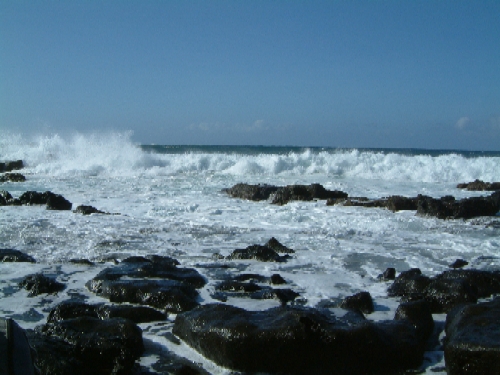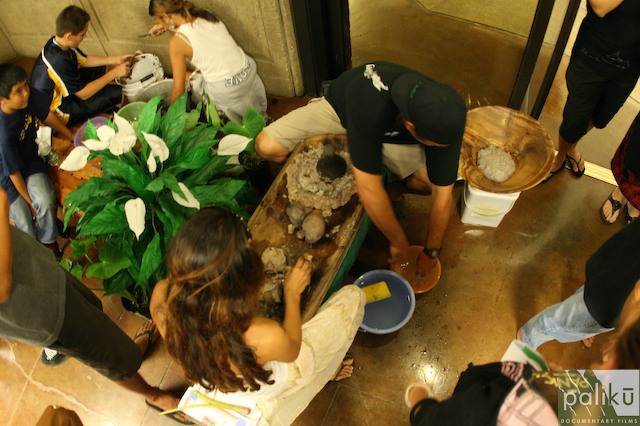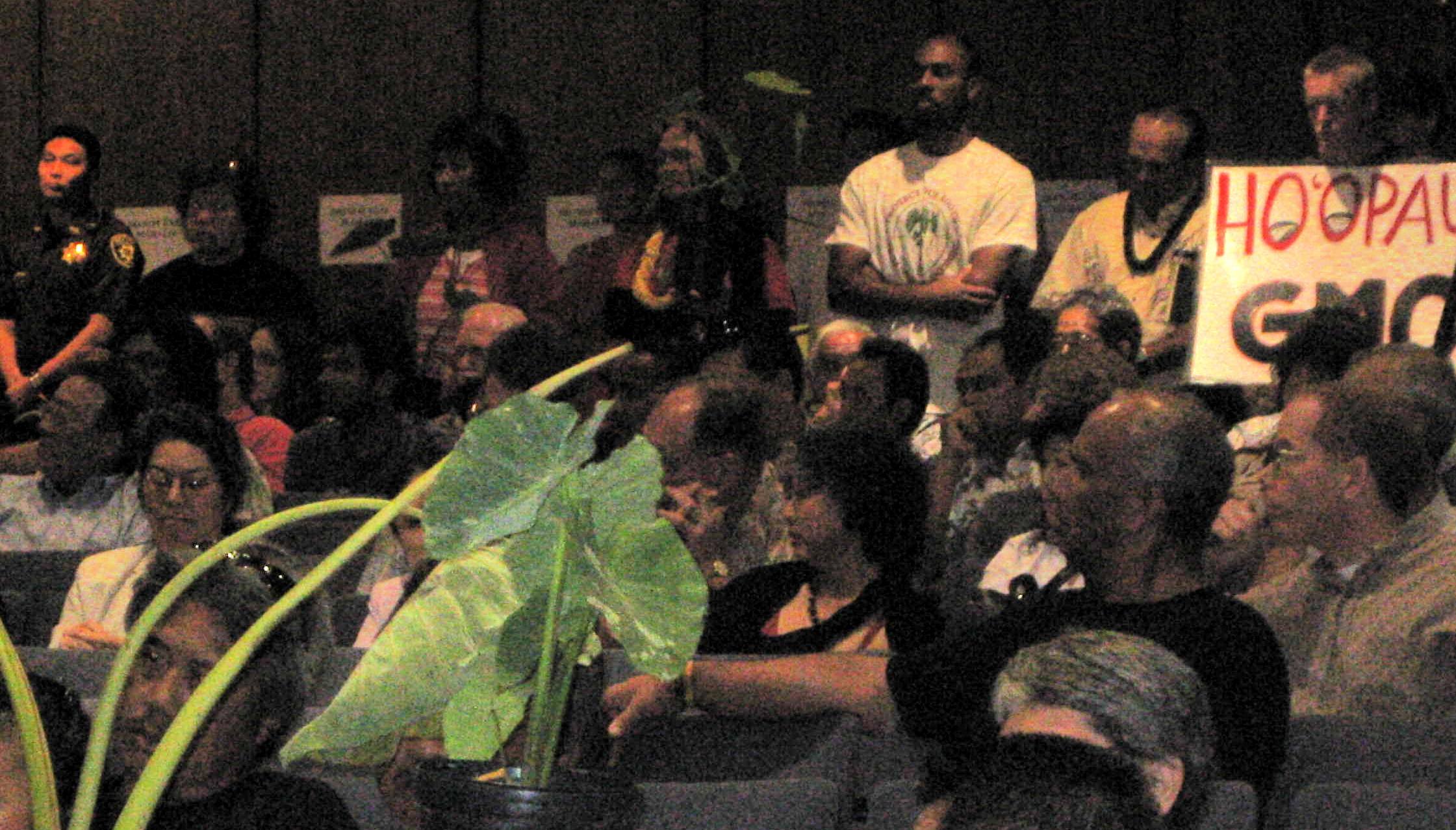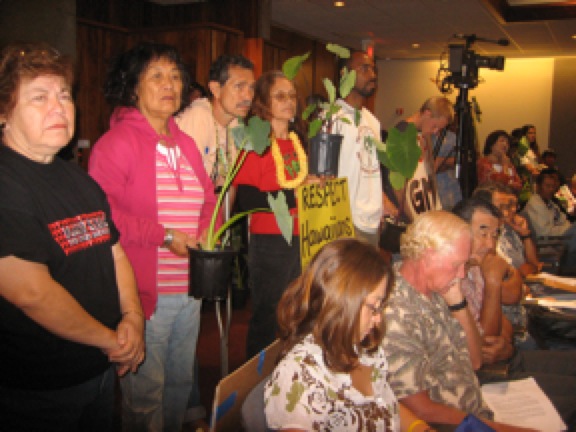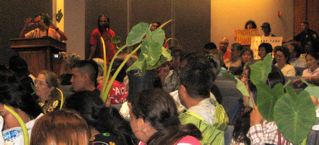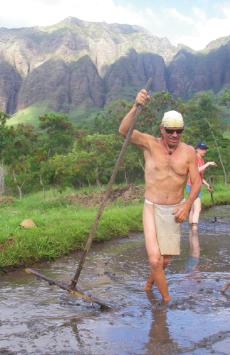Blog
News, updates, finds, stories, and tidbits from staff and community members at KAHEA. Got something to share? Email us at: kahea-alliance@hawaii.rr.com.
Fate of Taro Bill SB958 to be Decided Thursday
We received word that the bill for a 10-year moratorium on GMO taro has been scheduled for decision-making! Thursday, April 3, 11AM in State Capitol Room 325.
Because we can’t say it any better than this:
I was working in my taro patch this morning in Waipi’o Valley, clearing my head, listening to the wind and the water, and I thought of the profound question you posed to me at yesterday’s hearing. Who own’s the taro? Awesome question, I must admit it startled me for a second, because in its simplicity it really speaks to the core of the whole issue of genetic engineering of kalo. “Who owns the taro”, you ask? Ke Akua owns the taro!
Kalo is a gift that has been passed down to us from our ancestors, generation to generation, for thousands of years. We are merely the current caretakers. I get paid for my hard work and to cover the expenses of producing poi, but the kalo–Haloa– does not belong to me. U.S. patenting laws state that if you are able to genetically manipulate one of God’s creations, you now own the creation. My spiritual beliefs have a hard time comprehending this.
Indigenous people around the world are struggling with this same issue–the Ojibwe protecting the wild rice, the Pueblo protecting the corn, the Inca protecting the potato. They all share the same ancestral ties and values to their life-giving crops as Hawaiians do with kalo. We all share the same disbelief at the utter disrespect for our culture, our heritage, our ancestors.
The huge outpouring of support for SB958 that was represented by the more 6000 written testimonies presented to the Ag Committee yesterday is just the tip of the iceberg. I keep hearing that we need to get the input of the Hawaiian community on this issue. Read those testimonies–they come from the heart, they come from the Hawaiian community. This passionate support for the protection of Haloa will never go away because this is our identity, this is ohana.
Hawaiians are standing up proud and strong, reconnecting to our culture, speaking our native tongue, proud of our past, confident of our future. We are honoring our kupuna, teaching our children, understanding our identity. In an effort to move forward in a positive direction, people are going back to their roots, only to find that our very roots are now threatened. I heard people yesterday who oppose SB958 say that they respect the culture, they understand… but. If they truly respected, if they truly understood, we would not be having a hearing. They would leave Haloa alone.
This is not an issue about science, academic freedom, economic investment, or the price of poi on the grocery shelf. As the language of SB958 states, this is an issue about respecting the cultural integrity of that which is vital to the identity of Hawai’i. In your powerful position as an elected decision maker, you have the ability to help heal a wound that has festered in Hawai’i for the last 115 years. In my humble opinion, in the interest of what is best for the future of Hawai’i, it is your kuleana to participate in this healing process. Please malama Haloa, please support SB958.
- Me ke aloha, Jim Cain, Farmer, Waipi’o Valley
You, too, can support and malama Haloa. Today, HALOA NEEDS YOUR VOICE.
Please take a few minutes to call these seven representatives on the Agriculture Committee and strongly urge them to pass SB958 without any amendments. The entire agriculture committee is up for re-election this year and many of their opponents are in vocal support of SB958!
Clift Tsuji HAWAII – SOUTH HILO TO KURTISTOWN
586-8480; fax 586-8484; From the Big Island, toll free 974-4000 + 68480 reptsuji@Capitol.hawaii.gov
Jerry L. Chang HAWAII – KEAUKAHA TO SOUTH HILO
586-6120; fax 586-6121; From Big Island, toll free 974-4000 + 66120 repchang@Capitol.hawaii.gov
Glenn Wakai OAHU – MOANALUA TO SALT LAKE
586-6220; fax 586-6221 repwakai@Capitol.hawaii.gov
Ryan I. Yamane OAHU – WAIPAHU/MILILANI
586-6150; fax 586-6151 repyamane@Capitol.hawaii.gov
Kyle T. Yamashita MAUI – PUKALANI TO ULUPALAKUA (UPCOUNTRY)
586-6330; fax 586-6331; From Maui, toll free 984-2400 + 66330 repyamashita@Capitol.hawaii.gov
Colleen Rose Meyer OAHU – KANEOHE TO LAIE
586-8540; fax 586-8544 repmeyer@Capitol.hawaii.gov
Joey Manahan OAHU – SAND ISLAND, MOKUEA, KALIHI KAI, KAPALAMA
586-6010; fax 586-6011 repmanahan@Capitol.hawaii.gov
The five representatives below have expressed support of SB958- it is important to call them ONCE to mahalo their wisdom and encourage their continued support of SB958- with NO amendments!
Tom Brower OAHU – WAIKIKI/ALA MOANA 586-8520; fax 586-8524 repbrower@Capitol.hawaii.gov
Lyla B. Berg OAHU – KAHALA TO HAHAIONE
586-6510; fax 586-6511repberg@Capitol.hawaii.gov
Faye P. Hanohano HAWAII – PUNA/PAHOA
586-6530; fax 586-6531; From the Big Island, toll free 974-4000 + 66530 rephanohano@Capitol.hawaii.gov
Robert N. Herkes HAWAII – PUNA TO KONA
586-8400; fax 586-8404; From the Big Island, toll free 974-4000 + 68400 repherkes@Capitol.hawaii.gov
Corinne W.L. Ching OAHU – NUUANU/ALEWA HEIGHTS
586-9415; fax 586-9421 repching@Capitol.hawaii.gov
Take Our Advice, No Be Hard Head
From Marti:
Like everybody else, we’ve been watching the news coverage about the closing of Molokai Ranch. We’ve seen how the corporation has tried to spin this event to throw blame at the community for opposing the La‘au Point development. The same tactic was tried with Superferry. But, I gotta say, it still ain’t working.
It is not the community’s fault when a corporation has a bad idea, sinks a whole bunch of money into it, and it fails. When somebody says “ah, this isn’t gonna work, don’t do it,” but a corporation goes and does it anyway… that’s called hard-head.
To see how hard head this corporation is… and how resilient the people of Molokai are, take a look at this list of news coverage & commentary compiled by Molokai residents.
La’au Point Residents Not At Fault by Lee Cataluna
http://www.honoluluadvertiser.com/apps/pbcs.dll/article?AID=2008803280357
Karen Holt and Todd Yamshita were on KGMB 9 new this morning talking about the Ranch shutdown, the closure of access, buying the Ranch, and windfarms.
http://kgmb9.com/main/content/view/5093/108/
Maui News Articles
Future of proposed project at Laau Point is unclear
http://www.mauinews.com/page/content.detail/id/501866.html?nav=10
Residents resolve to move on
http://www.mauinews.com/page/content.detail/id/501867.html?nav=10
Star Bulletin Editorial/Articles
‘Mothballing’ Molokai Ranch would be devastating
http://starbulletin.com/2008/03/26/editorial/editorial01.html
Molokai parent calls isle unit ‘cash positive’
http://starbulletin.com/2008/03/26/business/story01.html
Molokai Ranch’s imminent closure brings uncertainty
http://starbulletin.com/2008/03/26/news/story02.html
Honolulu Advertiser Articles
Ranch’s fate determined by billionaire
http://www.honoluluadvertiser.com/apps/pbcs.dll/article?AID=/20080326/NEWS01/803260431
Molokai Ranch closure leaves bleak prospects
http://www.honoluluadvertiser.com/apps/pbcs.dll/article?AID=/20080326/NEWS01/803260433
Molokai Ranch timeline
http://www.honoluluadvertiser.com/apps/pbcs.dll/article?AID=/20080326/NEWS01/803260432
Some legal mana’o/analysis on recent Water Decisions from a Save La’au attorney:
“Three recent decisions need to be understood. First, in September 2007, the Attorney General finally concluded that the State could not lease the MIS to MPL until an environmental assessment is completed.
Second, on December 26, 2007, the Hawai`i Supreme Court vacated the Commission on Water Resource Management’s permit to withdraw and use water from Well #17 for the West End of Moloka`i. In the Matter of the Contested Case Hearing on the Water Use Permit Application Filed by Kukui (Molokai, 174 P.3d 320; 2007 Haw. LEXIS 381 (2007) (Kukui).
Third, on December 14, 2007, Maui County enacted a new ordinance (Ordinance #3052) that requires verification of water supply before subdivision is approved. MCC 14.12.040 and 18.04.020(G)…no permitted allocations from Well 17. At this point, MPL has neither the right to use Well 17 water, nor the right to transport water using the MIS….
The bulk or “piecemeal” sale option and the agricultural subdivision option present inaccurate information. These lots cannot be subdivided into more than 1500 – or even 215 plus 223 – lots. Ordinance 3502 (2007) would not allow this to occur because there is no water source available for these lots. Moreover, MPL over-estimates its ability to sell any of the parcels of land given the fact that it currently has no guaranteed water source for any of its lots. No buyer would purchase a lot on the dry West End without any assurance of a water source.
It is unfortunate that MPL has misled GuocoLeisure and its shareholders regarding the value of MPL’s land. Not only was the Hallstrom Group’s valuation inaccurate when it was made, but the three recent decisions (the Hawai`i Supreme Court’s in Kukui, the Department of the Attorney General’s regarding the MIS, and Maui County in the new subdivision ordinance) make it abundantly clear that 1) MPL has no guaranteed source of water to develop its lands and 2) the lands cannot be easily subdivided. MPL’s land is worth far, far less than MPL claims.”
Words from Molokai: "This island has a chance..."
By now, most of everyone has heard the news of the surprise announcement of the Molokai Ranch shut down. On the last days events, a few words to share from from Kahualaulani on Molokai:
We are still sorting it all out over here. And while it is a shock, it is not really a surprise…Molokai Ranch’s true colors have finally been shown. They have played the “employee card”: they couldn’t shove their unwanted development down the throat of this community, so now they will take it out on their own workers, while blaming the development opposition for the “need” to do this.
Indeed, the Ranch states in their press release: “Unacceptable delays caused by continued opposition to every aspect of the Master Plan means we are unable to fund continued normal company operations.” But this is so not true. The community did not object to “every aspect” of the Plan; the community objected to the La‘au development aspect of the Plan. We have been consistent from the start in saying the there are many good parts of the Plan (and the community put a lot of work into creating those parts), but that developing La‘au is unacceptable to the large majority of this community.
We have also been consistent in saying to Molokai Ranch and Plan supporters, lets all come back to the table and find solutions to this issue: let’s find real alternatives to this development, and other types of economic engines besides development. They chose not to listen, and to to try to ram-rod their project through. Wrong idea. And now they are bringing their oft promised/threatened “doomsday scenario” down on this community – by laying off their workers and starting to sell-off their lands. What a mean-spirited and cruel reaction to not getting their way (‘I’m taking my ball and going home!”) They have already sold half of Na’iwa (the ancient makahiki grounds) and Ka’ana (the birthplace of hula) looks to be next…
But let’s be clear here: all the “delays” were caused by Molokai Ranch’s own decisions: by making this whole thing into an “all or nothing” “take it or leave it” thing (either take/accept the Plan with La‘au development, or no Plan); by choosing not to listen to this community saying ‘”A’ole La‘au” (No to la‘au!); and by voluntarily withdrawing their shoddy EIS after massive community and LUC opposition to it, (and thus having to return to a draft EIS stage). They were also seriously “delayed”/affected by two recent Supreme Court Decisions – one that took away their allocation of potable water, and the other that neutralized their preferred method of transporting it. (But I don’t hear them blaming the Supreme Court!)
The sentiment in the community is that we feel deeply for the workers who have lost their jobs, and we will support them in whatever ways we can: by trying to find them new jobs, or by creating new jobs with better economic engines, and by helping to provide food during this time. Molokai takes care of her own.
But also, we see this as a great opportunity to bring stewardship of this island back to the people of Molokai. We were already working on various solutions before this happened: from investors with more appropriate endeavors, to the UPC windfarm, to conservation buyers, to buying the Ranch, to a combination of all of the above. Now we are going to push to bring those kinds of things to pass if we can.
It was a historic day yesterday, but now, with your help and continued support, we might truly be able to make history. This island has a chance to have economic, energy, and food independence – a truly sustainable and self-sufficient community. A hub of sustainable agriculture, environmental stewardship, Hawaiian culture and aloha. We can Ho’i i ka Pono! We can truly Keep Moloka’i, Moloka’i!
(first photo from rmayda on flickr, second from Paula Kawal.)
Links to articles:
Molokai Ranch Shutting Down (MPL Press Release)
http://www.themolokaidispatch.com/node/1837
“Doomsday” Has Arrived (Molokai Dispatch)
http://www.themolokaidispatch.com/node/1851
Mayor Tavares And Molokai Council Member Mateo Respond To Ranch Closure (Molokai Dispatch)
http://www.themolokaidispatch.com/node/1841
Lingle Focuses On Molokai Ranch Employees, Island’s Economy (Molokai Dispatch)
http://www.themolokaidispatch.com/node/1840
Molokai Ranch Shuts Down (Molokai Times Article and community and reader’s comments)
http://www.molokaitimes.com/articles/8324115936.asp
Molokai Ranch to quit island (Honolulu Star Bulletin Article)
Stung by rejection of its planned luxury project, the owner will lay off 120 staffers and seal off the land…”
http://starbulletin.com/2008/03/25/news/story01.html
Molokai Ranch to close, lay off 120 (Honolulu Advertiser Article)
http://www.honoluluadvertiser.com/apps/pbcs.dll/article?AID=/20080325/NEWS01/803250367
See the Historic Movement to Save Haloa
A hearing was held March 19, 2008 to protect Hawai’i's ancestor and native crop – taro – from genetic modification and patenting. 6,000 people submitted written testimony in support. 8 hours of verbal testimony were given.
Now, the legislators need to pass this bill. Help them make the right decision. Click here to get involved.
Images from the hearing on SB 958:
http://maoliworld.ning.com/profile/Naalehu (click here to see more of Na’alehu’s pics)
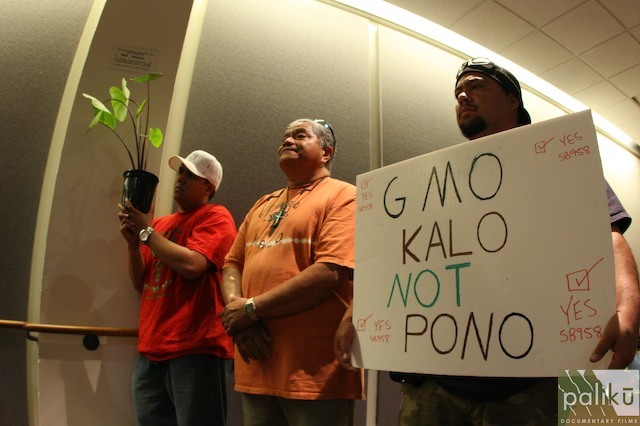
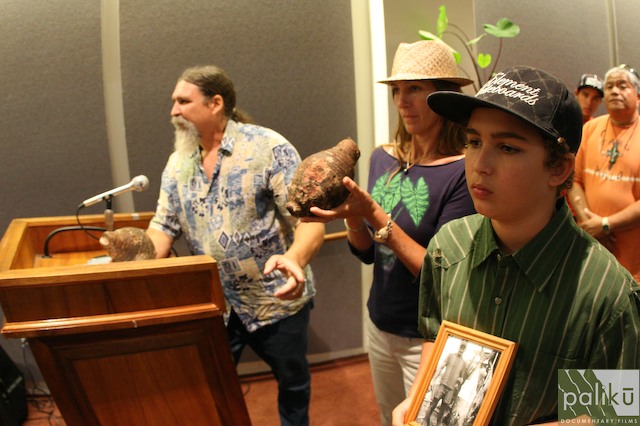
from KAHEA:
6,000 & growing...
from Marti:
Here is a letter that was published today in the Honolulu Advertiser (one of the few so far):
GENETIC MODIFICATION
CHANGING KALO ERODES HAWAIIANS’ LIFELINE
My mother used to serenade me with songs about exotic places. Travelogues of oceans, forests and island sweethearts. This is how she passed on knowledge. Songs reflecting simpler times and storytellers of the past. Our people were more disconnected than ever. Being Hawaiian was not popular. So to sing her aloha was her moment of self determination.
Her spiritual integrity impressed upon me indigenous ways of knowing. “Leave that popolo berry! It wants to grow there.”
If someone was to have told her she could no longer share limu among her classmates without a permit she would have sighed, “That’s why we going die out.” But she would respectfully accept it. She felt people saw her particular relationship with the ‘aina as peculiar.
Replanting kalo is the living lifeline that holds the stories of our past. Changing the genetic makeup of kalo will erode that lifeline.
Hawaiians are now re-establishing their priorities in maoli culture. A moratorium on varieties of maoli kalo and introduced kalo as specified in SB 958 is needed for more reasons than just keeping steroid-like pumped up food off our tables.
It’s needed so we can pass on to our keiki more than just “stones.” We can pass on the story of Haloa.
-Meala Bishop
Waiahole kalo farmer, Kane’ohe
To submit testimony on the protection of taro, click here.
what needs to be changed
The KAHEA office has been abuzz all weekend–the fax machine on overdrive–as staff and volunteers plowed through the task of organizing and compiling thousands of letters of testimony in support of a 10-year moratorium on genetic modification of kalo (taro).
Mahalo to everyone who has lent their voice in support of Hawai`i’s traditional farmers! As Bryna likes to point out: “Without the right to protect our traditional food resources what will remain of our culture or our rights?”
From Bryna:
The shared kuleana to save kalo and traditional farming is not only historical or cultural–it is a political imperative for Hawaii’s survival on this rapidly changing planet.
Thousands of letters of personal testimony, expert opinions and petitions for protection speak to the importance of pure kalo and traditional farming techniques for Hawaii. This is a truly pono moment in the history of humanity- thousands and thousands of people of all backgrounds are joining together to protect a plant species from irreversible genetic modification- and honoring an ancient ancestor and endangered Hawaiian lifestyle.
The message from the people is simple and clear: Haloa is family, Kalo is life, being in the Lo`i is living! It is not appropriate, necessary nor acceptable to engineer kalo into a genetically modified organism. The observation of the kalo farmers is profound: the kalo plant is not what needs to be changed.
Ka Leo Covers Support for GMO Kalo Moratorium
From today’s Ka Leo:
“We would like a total ban, but that’s not being responsible. This is a cooling off period,” said Jerry Konanui, a Native Hawaiian kalo farmer whose family has grown the plant in the Puna district of Hawai‘i for the past eight generations.
“The message from the people is simple: Hāloa is family, kalo is life, being in the lo‘i is living,” said Bryna Storch of KAHEA, a Hawaiian cultural and environmental advocacy group that organized the testimonies in support of the measure. “It is not appropriate, necessary nor acceptable to engineer kalo into a genetically modified organism.”
Genetic engineering, the process of inserting genes from one species into another resulting in the creation of GMOs, has been conducted in Hawai‘i for over a decade. Statistically, over 2,000 field tests of genetically engineered crops have been coordinated in the islands thus far, making Hawai‘i the most genetically tested agricultural region in the world, according to Earthjustice, an environmental advocacy group.
See the full article.



